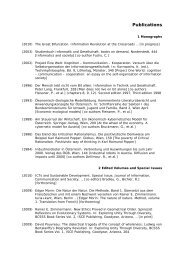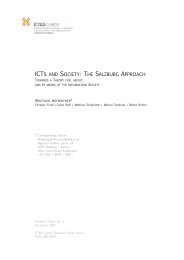CHRISTIAN FUCHS - ICT&S - Universität Salzburg
CHRISTIAN FUCHS - ICT&S - Universität Salzburg
CHRISTIAN FUCHS - ICT&S - Universität Salzburg
Create successful ePaper yourself
Turn your PDF publications into a flip-book with our unique Google optimized e-Paper software.
Christian Fuchs: Social Networking Sites and the Surveillance Societycorporations and other firms engage in it. It is unlikely that they will automatically limitthese endeavours because their primary interest is and must be the accumulation ofmoney profits. Therefore opting out of existing advertising options is not a solution tothe problem of economic and political surveillance. Even if users opt out, mediacorporations will continue to collect and assess certain data, to sell the users asaudience commodity to advertising clients, and to give personal data to the police.Citizen action can limit surveillance actions of corporations, but it will not securecitizens from corporate and state surveillance because the underlying problems aredominant corporate interests and the existence of new imperialism (Harvey 2003,Panitch/Leys 2004, Wood 2003). Surveillance on social networking sites shouldtherefore be framed in the context of pressing political problems, such as global warand the unequal distribution of wealth and income. To try to advance criticalawareness and to surveil corporate and political surveillers are important politicalmoves for guaranteeing civil rights, but they will ultimately fail if they do not recognizethat electronic surveillance is not a technological issue that can be solved bytechnological means or by different individual behaviours, but only by bringing aboutchanges of society.Neo-Luddite solutions to electronic surveillance, i.e. to stop using the Internet or socialnetworking sites, would not be a wise move because the data in our survey indicatethat young people find making and maintaining contacts and friendships with the helpof the Internet a tremendous opportunity that they consider very important. 59.1% seemaintaining existing contacts and 29.8% establishing new contacts as major advantageof social networking sites. Neo-Luddism would create a group of critical Internetdropouts that would not only be disconnected from the Internet, but also disconnectedfrom social opportunities that bring advantages. Neo-Luddism would therefore questionelectronic surveillance, but at the same time intensify the digital divide. It would bringdisadvantages such as meeting less people and staying less in contact with familymembers, old friends, colleagues, etc.One alternative is to create non-commercial, non-profit social networking platforms onthe Internet. It is not impossible to create successful non-profit Internet platforms, as theexample of Wikipedia, which is advertising-free, has free access, and is financed bydonations, shows. But the difficulty is that social networking platforms have to storelarge amount of data, especially profile data that contain images, videos, etc, whichrequires tremendous server capacities. It is certainly easier and probably more efficientto organize such huge data storage endeavours in the form of profit-orientedbusinesses. But this orientation at the same time brings about the risk of extended andintensified electronic surveillance. We are not saying that non-commercial, non-profitplatforms are devoid of this risk, but that there is a reduced likelihood that electronicsurveillance for economic reasons will take place on such platforms and an increasedlikelihood that such platforms will try to protect its users from state surveillance. Withincapitalism, it is certainly very difficult to try to organize such non-profit onlinealternatives because everything that is non-profit and non-commercial tends to beconfronted by shortages of resources, which makes sustainable performance difficult.Trying to organize alternatives might be precarious, difficult, and confronted with ahigh probability of potential failure. But the same time it might be the only constructivealternative to corporate control and corporate concentration processes in the Interneteconomy that tend to reinforce processes of economic and political electronic106









